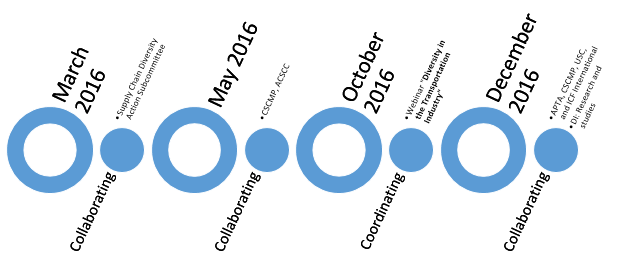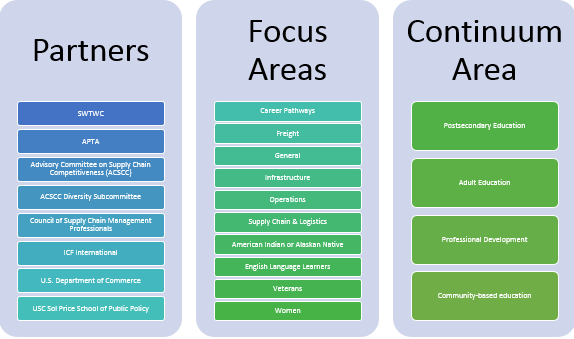General goals
In a collaborating partnership with key players in the transportation industry and academia, SWTWC will conduct outreach to underserved populations traditionally disconnected from supply chain-related jobs; such as women, veterans, and English language learners (ELL; formerly referred to as ESL), and promote education and training programs and access to career opportunities available in supply chain.
Duration
Status: Ongoing
Anticipated Partnership Duration: March 2016 – Center Lifetime
Timeline and Overview

This partnership involves various key players in industry and academia who are collaborating on webinars, discussion panels, and research to help distribute knowledge on workforce needs and promote access to the supply chain and logistics sector for underserved populations. Projects in the Supply Chain Diversity Workforce Initiative also includes the development of career pathways supporting transportation, storage, distribution managers, logisticians, and laborers and freight, stock, and material movers.
On March 7, 2016, SWTWC assembled a Supply Chain Diversity Action Subcommittee meeting of leaders and experts to steer and advise SWTWC in developing and implementing a series of webinars and meetings discussing specific workforce needs and entry barriers of underserved populations in supply chain.
Following the meeting, Rick Blasgen who is the President and Chief Executive Officer for the Council of Supply Chain Management Professionals (CSCMP) and Chair for the U.S. Department of Commerce Advisory Committee on Supply Chain Competitiveness (ACSCC), connected SWTWC to Anne Strauss-Wieder who is the Director for Freight Planning and serves on the Diversity Subcommittee Chair for Workforce Development.
Through an in-depth discussion of workforce issues in May 2016 with Strauss-Wieder, SWTWC Associate Director Tyler Reeb learned that low-wage supply chain workers are citing transportation access to work locations as a major barrier to entry. Communities who live on the fringe of urban areas have difficulty finding transportation to supply chain hubs. In response to this finding, Reeb is developing Memorandum of Understandings (MOUs) between public transit leaders and supply chain leaders to ensure public transit routes offer access to major supply chain hubs; thus, eliminating the barrier and retaining the supply chain workforce. In addition, Reeb is also exploring other possibilities; e.g. private shuttles to connect commuters directly to workplaces. This serves to attract potential employers and employees, and further expand the labor market pool for supply chain.
SWTWC also coordinated a webinar under the Supply Chain Diversity Initiative hosted by American Public Transportation Association (APTA). The webinar titled “Diversity in the Transportation Industry” (listed coordinating partnership on page 39) examines diversity as a significant cultural value, and explores and celebrates diversity in the transportation industry.
SWTWC is also in discussion with Joe Niegoski, Senior Director for Workforce Development and Educational Services for APTA to support the Supply Chain Diversity Initiative future efforts in 2017.
SWTWC team members, ICF International and USC Sol Price School of Public Policy are also developing a research initiative in partnership with APTA and CSCMP to analyze ways that public transportation providers can expand access to supply chain workplaces for entry-level employees.
In 2014, Professor Genevieve Giuliano from METRANS UTC and USC Sol Price School of Public Policy also completed a study titled “Transportation and Access to Employment in City Heights.” City Heights is a large community in San Diego, California metropolitan area with sixteen distinguishable neighborhoods known for its ethnic diversity. The study examined access to employment opportunities by car and by public transit among City Heights residents. Giuliano compared access to economic opportunities between City Heights with San Diego County averages and fifteen comparison neighborhoods, and found that car access is far superior to transit access in City Heights, and that any transit improvements would need to be system-wide in order to have an impact on City Heights. The study identified two top policy solutions to link City Heights residents to jobs: 1) bring jobs into City Heights; and 2) increase job base in City Heights.
In collaborating partnerships with APTA and CSCMP, SWTWC will expand the methodology above to study other metropolitan areas.
SWTWC will also study ways to develop partnerships that also focuses on increasing local job bases and bringing job opportunities to undeserved communities in order to increase access to supply chain workplaces.
Key Deliverables
- SWTWC Workforce Initiative: Supply Chain Diversity
- SWTWC Supply Chain Diversity Action Subcommittee
- Webinar: “Diversity in the Transportation Industry”
- Expansion of the study: “Transportation and Access to Employment in City Heights”
- Additional education and training programs dedicated to underserved populations in the Center’s data clearinghouse
Anticipated Outcomes
Through a range of collaborating partnerships supporting the Supply Chain Diversity Workforce Initiative, SWTWC anticipates greater awareness and enhanced perceptions of supply chain careers that will result in a larger pool of talented applicants. The Initiative will also develop new methods and resources to engage underserved populations in subsequent recruitment campaigns.
SWTWC also anticipates in-depth studies on transportation and access to economic opportunities for underserved communities in the Southwest region will result in new innovative methods to expand access for occupations in the supply chain sector and the transportation industry.
The collaborating partnerships will also establish an open source of information for thought leaders in supply chain to recruit and retain employees from underserved populations available on SWTWC’s website; including better methods of engagement, and increase incentives and training for individuals to join the transportation workforce, particularly in supply chain.
SWTWC will incorporate all promotional materials for underserved populations at SWTWC.org to effectively engage various stakeholder groups and promote diversity in the transportation workforce; e.g. “Diversity in the Transportation Industry,” resources for TTAP, and ELL resources.
Contribution Analysis
- SWTWC developed the Supply Chain Diversity Workforce Initiative.
- SWTWC established the Supply Chain Diversity Action Subcommittee.
- SWTWC conducted outreach with CSCMP, ACSCC, and APTA to ensure public transit routes offer access to major supply chain hubs.
- SWTWC coordinated speakers for “Diversity in the Transportation Industry” Webinar.
- SWTWC expanded on the methodology utilized in City Heights to study other metropolitan areas in 2017.
- SWTWC studying ways to bring supply chain jobs to local communities.
Documentation
APTA. (2016). “Diversity in the transportation industry: Attracting and engaging diverse groups.” Retrieved from http://www.apta.com/resources/workforce/Pages/Diversity-in-the-Transportation-Industry.aspx.
Boarnet, M., Giuliano, G., Hou, Y., & Shin, E. (2014). Transportation and access to employment in City Heights. Retrieved from https://www.swtwc.org/wp-content/uploads/2016/12/Transportation-and-Access-to-Employmen-tin-City-Heights.pdf.
